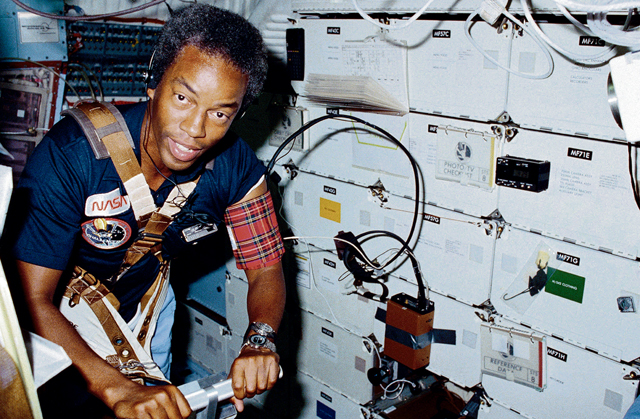
NASA Identifier: 536252main_inflight
On Aug. 30, 1983, the Space Shuttle Challenger lifted off from Kennedy Space Center, Florida.
Aboard that mission was Air Force Col. Guion Bluford Jr., the first African American to fly in space, said Secretary of Defense Lloyd J. Austin III in a speech at the Black Engineer of the Year Awards STEM Conference yesterday in National Harbor, Maryland.
Bluford became a NASA astronaut in August 1979. His technical assignments included working with space station operations, the remote manipulator system, spacelab systems and experiments, space shuttle systems, payload safety issues and verifying flight software in the Shuttle Avionics Integration Laboratory and in the Flight Systems Laboratory. A veteran of four space flights, he was a mission specialist on Space Transport System-8, STS 61-A, STS-39 and STS-53.
Bluford logged a total of 688 hours in space. He retired from the Air Force as a colonel in 1993 and left NASA the same year.
A few years after his historic 1983 mission, Bluford was named Black Engineer of the Year, the secretary said.
“Although he soared through the heavens, he always remained down to earth. And he once said, ’I felt I had to do the best job I could for people like the Tuskegee Airmen, who paved the way for me,’” Austin said, referring to the African American fighter and bomber pilots and crew members who formed the 332nd Fighter Group and the 477th Bombardment Group (Medium) of the U.S. Army Air Forces. The Tuskegee Airmen had an impressive combat record in World War II.
“By breaking barriers for Black airmen during World War II, the Tuskegee Airmen propelled Col. Bluford higher. He stood on their shoulders. And today, young pilots and astronauts stand on his, Austin said, encouraging the engineer attendees to mentor young people and thus support America’s future.
The secretary noted that over the past 37 years, recipients of the Black Engineer of the Year Awards have been electrical engineers, pilots, astronauts and physicists.
“They’ve made huge breakthroughs. They’ve broken down barriers. And they’ve been driven to serve, to make the world better, and to lift up the next generation,” he said. “You know, that commitment to service has always been crucial for solving our toughest problems and for defending our country.”
Austin said Defense Department scientists and engineers, along with partners in academia and industry, have always pioneered critical innovations to defend America. They’ve operated satellites that enable global navigation, developed vaccines that save lives, laid the foundations of the internet — and the list goes on.
Just last month, DOD officials announced the creation of its newest university-affiliated research center at Howard University — the first ever established at a historically Black university, he said.
Austin said this initiative brings a consortium of nine historically Black colleges and universities under Howard’s leadership to research technical autonomy and develop innovative ways to aid warfighters.
“We’re determined to continue innovating to make America more secure. And that means drawing on the strengths of all people,” he said.


